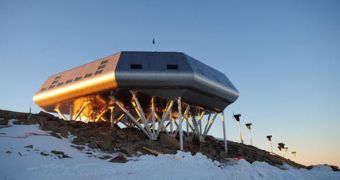More than two years ago, Belgium announced its intentions of constructing a zero-carbon permanent base in Antarctica, one that would rely solely on smart materials and renewable energy sources in order to survive. On Sunday, that dream came true, and the Princess Elisabeth Base was inaugurated as the world's first emission-free research facility in the Antarctic. The main goal behind this initiative, created to celebrate the International Polar Year (2007-2008), is to prove to the world that sustainable energy can even be employed in the harshest environments on the planet.
The reasoning says that if it can be done in Antarctica, then it can be done elsewhere as well. There are many people throughout the world who still do not believe that global warming is real, and who argue that there is no need for such initiatives. Others state that solar panels and wind turbines are too expensive to produce, and that they do not offer the same amount of electricity the modern society is used to. The Princess Elisabeth Base (PEB) is the clearest example that they are wrong.
The high-end, ultra-modern research facility is different from other research outposts even in the way it's constructed. Instead of being placed directly on the ice, on adjustable “feet,” it's perched on a granite ridge, where it looms over the ground on steel rods, designed to prevent snow from accumulating around or over it altogether. The top of the building is provided with a large number of solar panels, while wind turbines can be seen in the background.
Even the way the windows are fashioned is different from similar structures, because here the only design restriction has been usefulness. Thus, the windows conserve heat superbly, which adds to the amount of electricity other systems reduce as well. In addition, toilet and shower water is recycled using complex chemical processes, and can be used for up to 5 times before it's finally evacuated in a crevasse.
“If we can build such a station in Antarctica, we can do that elsewhere in our society. We have the capacity, the technology, the knowledge to change our world,” the project director of the station, Alain Hubert, told Reuters at the ceremony.
“The global credit crisis is a result of unsustainable behavior. We can't deal in an unsustainable way with our planet, otherwise we will also face a crisis which will be even bigger than the credit crisis,” Belgium's Umicore chairman Thomas Leysen added. The company is a leading producer of catalysts.

 14 DAY TRIAL //
14 DAY TRIAL //